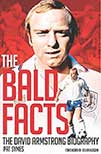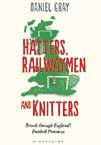Search: 'Ian Ayre'
Stories
 The David Armstrong biography
The David Armstrong biography
by David Armstrong
with Pat Symes
Pitch Publishing, £17.99
Reviewed by Harry Pearson
From WSC 324 February 2014
There was always something a little Dickensian about Middlesbrough and Southampton midfielder David Armstrong. Small, prematurely bald, slightly portly with a face that fell naturally into an expression of melancholy, he was more Oliver Twist than the 1970s footballer of popular mythology. Even his nickname Spike has a whiff of the Victorian workhouse about it.
The nickname, it transpires, was given to him by Middlesbrough team-mate Basil Stonehouse for no other reason than that Stonehouse thought someone in the squad should have it. It’s the kind of anticlimactic tale that seems to have characterised Spike’s career. A hard-working left-sided player and an excellent passer and crosser, Armstrong scored over 100 goals from midfield and was so robust at times he seemed indestructible (he made 356 consecutive appearances for Boro).
He was not a dribbler though, nor was he quick, both of which counted against him when it came to international honours – he was only capped twice by his country. Trophies too eluded him. At Ayresome Park Jack Charlton’s reluctance to spend money – faced with a choice between Trevor Francis or Alf Wood, Big Jack opts, naturally, for the latter – scotches Middlesbrough’s chances of silverware, while Southampton fall agonisingly short of a Double in 1983-84 with Armstrong playing in all 51 games.
While other footballers’ autobiographies are often brimming with bitterness or rancour, The Bald Facts is tinged with sadness and regret. Armstrong’s career ended by an ankle injury that was treated in so bungling a manner the player is barely able to stand up for several years, his finances in tatters, you come away from reading it with the impression that the midfielder feels let down, not necessarily by individuals, but by the game itself.
As is too often the case the player’s unworldliness has hardly helped his cause. You don’t need to be a genius to realise that when you are going to court for an alimony hearing driving into the car park in a brand new red Mercedes is not the best idea. That’s what Armstrong does though. The results are predictable – his wife gets the house and whacking great yearly maintenance payments. “I came out of that court and burst pathetically into tears,” Spike records. There are a lot of tears in these pages, the odd laugh too, and a rather puzzling story about dognapping and Joe Laidlaw. Ultimately though there’s a sense of promise unfulfilled and of tales half told.
I started reading The Bald Facts during the hullabaloo that followed FA chairman Greg Dyke’s comments on the number of foreign players in the Premier League weakening the national team. Armstrong, of course, played when there were very few non-British professionals in the English top flight so it is instructive to see the midfield Ron Greenwood selected for the game against West Germany in 1982. Alongside Armstrong were Alan Devonshire, Ricky Hill and Ray Wilkins. Is that the sort of line-up that would strike fear into the hearts of the current Spanish, German or Brazilian sides?
There are now so many outlets for a fan’s fury that it has become a 24-hour job to be angry, writes Harry Pearson
A few years ago a friend of mine took his six-year-old son to his first match. It was at the Stadium of Light during a fractious period for the home side. They conceded early. As all around him fans shook their fists and vented their fury with the players, the manager, the owner, my friend looked across at his son. The boy was weeping uncontrollable. “What’s the matter?” his father asked. “I don’t like it. I don’t like it,” his son sobbed. “Why are the men so angry?” They left at half time.
 Travels through England’s football provinces
Travels through England’s football provinces
by Daniel Gray
Bloomsbury, £12.99
Reviewed by Charles Robinson
From WSC 321 November 2013
The ravaged post-industrial landscape of provincial England, with its boarded-up shops and disused factories, speaks of a working-class culture decimated by Thatcherism and modernism. Are we left with an endless hell of Nando’s, pound shops and Westfield shopping centres stretching the length and breadth of the land? Yes, in a way, answers Daniel Gray, author of Hatters, Railwaymen And Knitters, his superlative new book. But there’s hope in the oft-ignored footballing backwaters. Seeking to rediscover England and “Englishness” without attempting some sociological definition of it, Gray visits football grounds and their attendant communities in the hope of finding some commonality, some communalism, in this “alien, uncomfortable England”. He finds it – sometimes.
Gray starts his travels in the comfortable environs of home, Middlesbrough, and thus begins a search for identity, something once found easily at Ayresome Park thanks partly to two childhood friends, the threesome hunting for the autographs of players and staff they often don’t even recognise. From here we move on to Ipswich, Luton, Crewe, Burnley, Carlisle and beyond as Gray searches for the essence of English football.
Gray’s search is constantly, by turns, furthered and frustrated by contradictions and paradoxes. In Luton, the surfeit of white faces and offensive chants of the Kenilworth Road crowd reflect the “segregation and suspicion” of the town itself, despite the vibrancy and ethnic diversity of its markets and sports clubs. There’s a way forward here, Gray suggests, towards a more tolerant, inclusive and engaged community. A self-confessed reluctant patriot and leftie, Gray attempts to find the best in everything despite his occasional misgivings. It’s OK to believe in England and English football, seems to be the message. This is despite the fact that Luton is the original home of the English Defence League, formerly known as the United Peoples of Luton.
Gray, thankfully, eschews the Premier League and heads straight for the smaller towns and cities that contributed so much to the Industrial Revolution, with poverty and injustice pervading almost every chapter. The story of Luton’s Peace Day Riots of 1919, in which the town hall was burned down, is told with an historian’s eye for detail and context. The hardships of the workers in the factories and mills of Bradford and Burnley are also beautifully related, leading the assumption, or prejudice, as Gray admits, that football existed, and still exists, as a “working-class release valve”.
This prejudice is destroyed in part by a visit to Chester, home of a community-owned club in a prosperous part of England. Football can still surprise and the final chapter takes in a non-League game in Newquay, in which the barman safeguards Gray’s half-drunk pint until he reappears at half time to finish it.
While cynical and critical, the book is beautifully written; pessimistic and damning, yet joyful and full of love for the game. Gray’s journey is a personal search for the soul of English football but it’s one that we can all deeply sympathise with in this age of mass consumption and soulless plastic bowl stadiums. The reality remains of football offering, in the words of JB Priestley, a “more splendid form of life”. Daniel Gray’s wonderful book is proof of that.
 Rupert Murdoch blew terrestrial channels out of the water to buy Premier League rights in 1992 but he could now face tougher competition, writes Gary Andrews
Rupert Murdoch blew terrestrial channels out of the water to buy Premier League rights in 1992 but he could now face tougher competition, writes Gary Andrews
Two decades ago, Rupert Murdoch staked the success of his fledgling satellite TV business on paying £300 million for rights to the newly formed Premier League. Since then Sky has remained unchallenged in its dominance – and the sums of money are much larger – but there is a possibility they could be out-Skyed by companies looking to establish new technology in our living rooms.
